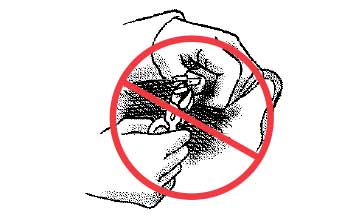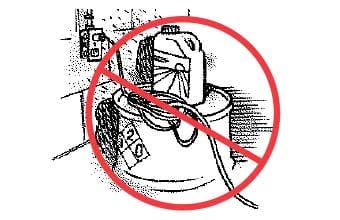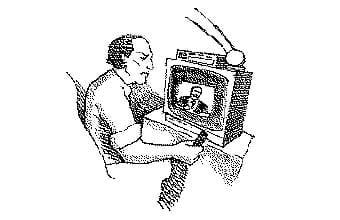Electrical Safety at Work and Home
Here are some key points.
- Electricity can be hazardous, resulting in shocks, burns, fires or explosions.
- Be on the lookout for electrical hazards at work and at home.
- Teach children about the dangers of electricity at a young age.
Electricity is important, but hazardous
- Electricity makes our lives easier at work and at home.
- At work, it powers numerous types of machinery and tools. At home, electricity powers a wide range of appliances including stoves, toasters, space heaters and TVs.
- But while electricity is important, it can also be very hazardous, resulting in shocks, burns, fires or explosions.
- It’s important to be very careful around electrically powered machinery, tools and appliances. Children should also be taught about the dangers of electricity.

Never remove the grounding prong from a three-pronged plug.

Keep cords away from heat and chemicals.

One sign of inadequate wiring is a picture on a TV that shrinks in size.
Outlets, plugs and cords
- Be sure you pay close attention to electrical outlets, plugs and cords.
- Never overload an electrical outlet. Also, make sure all outlets are cool to the touch. A warm or hot outlet may indicate a wiring problem.
- Never remove the third plug from a three-pronged plug or try to jam it into a two-pronged extension cord. Three-pronged plugs are used to ground electrical equipment. It’s important to do that for protection from an electrical shock.
- A very important way to protect yourself is to use ground fault circuit interrupters or GFCIs. These are special devices that monitor the flow of current into and out of outlets. If the electrical current is not following its normal path, GFCIs immediately turn off the power to the power tool or appliance you are using. GFCIs are critical in damp and wet areas.
- Teach children not to insert anything into the openings of an electrical outlet. You can get Underwriters Laboratory or UL-approved safety covers for these openings at your local hardware store.
- Here are a few safety tips concerning electric cords:
- Be on the constant lookout for frayed or otherwise damaged cords.
- Don’t lay cords anyplace where they can be walked on or run over.
- Watch out for warm extension cords – a sign of overload.
- Keep cords away from heat and chemicals.
- Only use heavy duty cords if you need an extension cord to operate power tools or heavy equipment.
Inadequate wiring
- Inadequate electrical wiring can create a fire hazard. Some of the signs of inadequate wiring are:
- the picture on your TV screen shrinks in size
- toasters, irons or other electrical appliances warm up very slowly
- lights dim or flicker, especially when an appliance is turned on
- you’re using extension cords because you don’t have enough outlets
- appliance motors slow down or burn out
- fuses blow or circuit breakers regularly trip
- Don’t try to fix wiring problems yourself unless you are qualified. It can be very dangerous.
More important electrical safety tips
- Read all warnings and follow all instructions when using appliances, electrically powered machinery and power tools.
- Stay away from anything powered by electricity when your hands are wet, or when you are standing in water or on a wet or damp surface.
- Keep any materials that could catch on fire away from heat-producing equipment and appliances.
- Keep electric cords away from hot surfaces. Too much heat can damage the cords.
- Use a non-metal ladder when you’re near any overhead electrical wires. Keep tall machinery away from overhead power lines. Be sure you stay a minimum of 10 feet away.
- Inspect wiring for rodent damage, and electrical boxes and connections for corrosion. Report any problems to your supervisor.
- Turn off and unplug TVs, radios, and computers during storms.
- Be sure any portable fans or space heaters are on stable surfaces where they won’t tip.
- Be especially careful if you use space heaters at home. Keep them clean and in good operating condition. Keep them away from draperies and any other flammable materials. Teach children to stay away from them. And turn them off and unplug them when you are not in the room.
Electricity Do’s and Don’ts
Do
- Teach children about the dangers of electricity at a young age.
- Regularly check the condition of plugs and electric cords.
- Store electric cords in a clean, dry location.
- Overload an electrical outlet or try to plug a three-pronged plug into a two-pronged extension cord.
- Operate appliances, electrically powered machinery or power tools when you are in water or your hands are wet.
- Try to fix a wiring problem yourself. Get a qualified electrician.
When you’re ready to work safely, you’re ready to work. See our full line of safety supplies, including respirators, eye and ear protection, coveralls, first aid and more.







